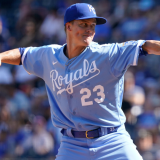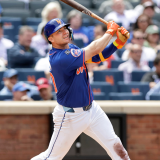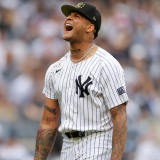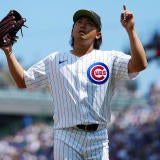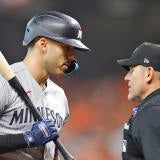On Thursday, the Philadelphia Phillies agreed to a 13-year pact worth $330 million with Bryce Harper. The deal contains no-opt outs, though it provides Harper with no-trade protection from the beginning. No one knows how the Harper contract will play out, but the lack of precognitive ability has never stopped us from naming winners and losers of this or that before.
As such, here are the winners and losers of the Harper signing based on what we know at this point.
Winners
Bryce Harper: You're going down as a winner almost anytime someone guarantees you $330 million.
That Harper reportedly didn't want an opt-out clause casts doubts on the rumors that he didn't want to play for the Phillies, or that his family didn't want him in Philadelphia. Maybe there was truth to all that speculation and the money won out? It almost doesn't matter. The bottom line is that Harper receives all the security he could ask for -- financially, and with the fact he'll receive a no-trade clause from the jump.
From a performance standpoint, Harper figures to enjoy playing in Citizens Bank Park. He should also enjoy being surrounded by the likes of Andrew McCutchen, Rhys Hoskins, J.T. Realmuto, and Jean Segura. The Phillies have the potential to run out a deep, above-average lineup. Manager Gabe Kapler can decide whether he wants to maximize Harper's power and bat him fourth or leverage his on-base skills and bat him second. Either way, Harper is the much-needed centerpiece of the offseason and now of the lineup.
Obviously there's risk that Harper becomes disliked by the Phillies fan base, or that the Phillies themselves fail to maintain a good enough roster around him to compete annually. But no fan base is going to like an underperforming star, and no team is guaranteed to be good for the next 13 seasons. Still, if you were going to list attributes of a club that's going to be competitive most years, it's probably one whose financial resources allow them to dole out contracts like this.
Philadelphia Phillies: We touch on what makes the Phillies winners already, but let's rehash.
In a vacuum, the Phillies had a good offseason with or without Harper by adding the aforementioned names, as well as David Robertson and other potentially useful relievers. The problem is that the Phillies needed to land an impact-level contributor to ensure they were closer to the top of what projects to be a loaded National League East.
Certainly a lot of ink has been spilled about how good Harper is, but most of the skepticism stems from one year of defensive metrics, or from his batting average. Keep this in mind: Harper hit .249 last season and still posted an on-base percentage of .393 and a slugging percentage of .496. His OPS+ was 133, or 33 percent better than the league-average mark. His career OPS+, for reference, is 139.
The Phillies probably hope that Harper can summon his MVP-winning 2015 self a couple times throughout this deal. Even if he doesn't, he should be an above-average contributor whose catch-all value metrics could receive a boost without him changing much at all.
Scott Boras: Again, you're going down as a winner almost anytime someone guarantees one of your clients $330 million.
Did Boras get everything he hoped to entering the winter? Probably not. There's no way of knowing for sure, but it stands to reason he would've preferred the same total (or greater) over a shorter term -- thus threatening or breaking the all-time record.
Still, Boras did get Harper the richest contract. He also secured a no-trade clause. Boras did this with a lukewarm market that featured few other known suitors, and at a time when teams are so hesitant to plop down real money that they're facing collusion accusations. How serious were the White Sox, Dodgers, and Giants? There's no telling, but Boras seemed to play his hand about as well as he could have.
Losers
Los Angeles Dodgers: You could say the Dodgers lucked out in the sense that they don't have to worry about Harper joining Manny Machado as National League West foes for the next 10-plus years. We don't really buy into that. What the Dodgers do have to worry about is encountering Harper in the postseason, and also making it to the postseason without Harper in their lineup.
The Dodgers had the most disappointing offseason in baseball. They were and remain a top-level contender who rather than adding talent over the course of the winter, seemed more willing to subtract it in order to cut down on costs. They're still the favorites in the West, and they may well end up winning their third consecutive pennant. But jeez.
You're the Dodgers, folks. Act like it.
Chicago Cubs: Ditto for the Cubs. That they never seemed seriously interested in Harper despite being linked to him for years is a disappointing development. It wouldn't be so bad if the Cubs had made substantial upgrades, but all ownership seemed interested in doing was crying broke.
To paraphrase ourselves, you're the Cubs, folks. Act like it.
San Francisco Giants: The Giants weren't on most anyone's radar entering the winter. That they finished as either the second or third team left standing in the Harper sweepstakes is somewhat impressive in its own right.
It's hard to feel bad for a franchise or a fan base that has enjoyed as much recent success as San Francisco. But the difference between landing Harper and not is essentially the difference between people taking them seriously as a plausible threat to the Dodgers and people … well, not. Quick, name a member of the Giants projected outfield. Now, name another.
For those stumped, the acceptable answers were: Mac Williamson, Steven Duggar, Gerardo Parra, Cameron Maybin, and/or Rule 5 pick Drew Ferguson. Woof.
Chicago White Sox: Speaking of woof ….
The White Sox seemed to be the top suitors on Machado for most of the winter. They lost out on him to a team in a similar place in a rebuild, then didn't seem to even make an effort for Harper.
It's pretty simple: To win you need talent. It's hard to win when all of your talent has to be on pre-arb or team-friendly deals because it's hard to assemble that much of baseball's most desired quantity.
The White Sox aren't likely whatsoever to threaten for a playoff spot -- even in the American League Central, the weakest division in baseball -- and they have themselves to blame.








